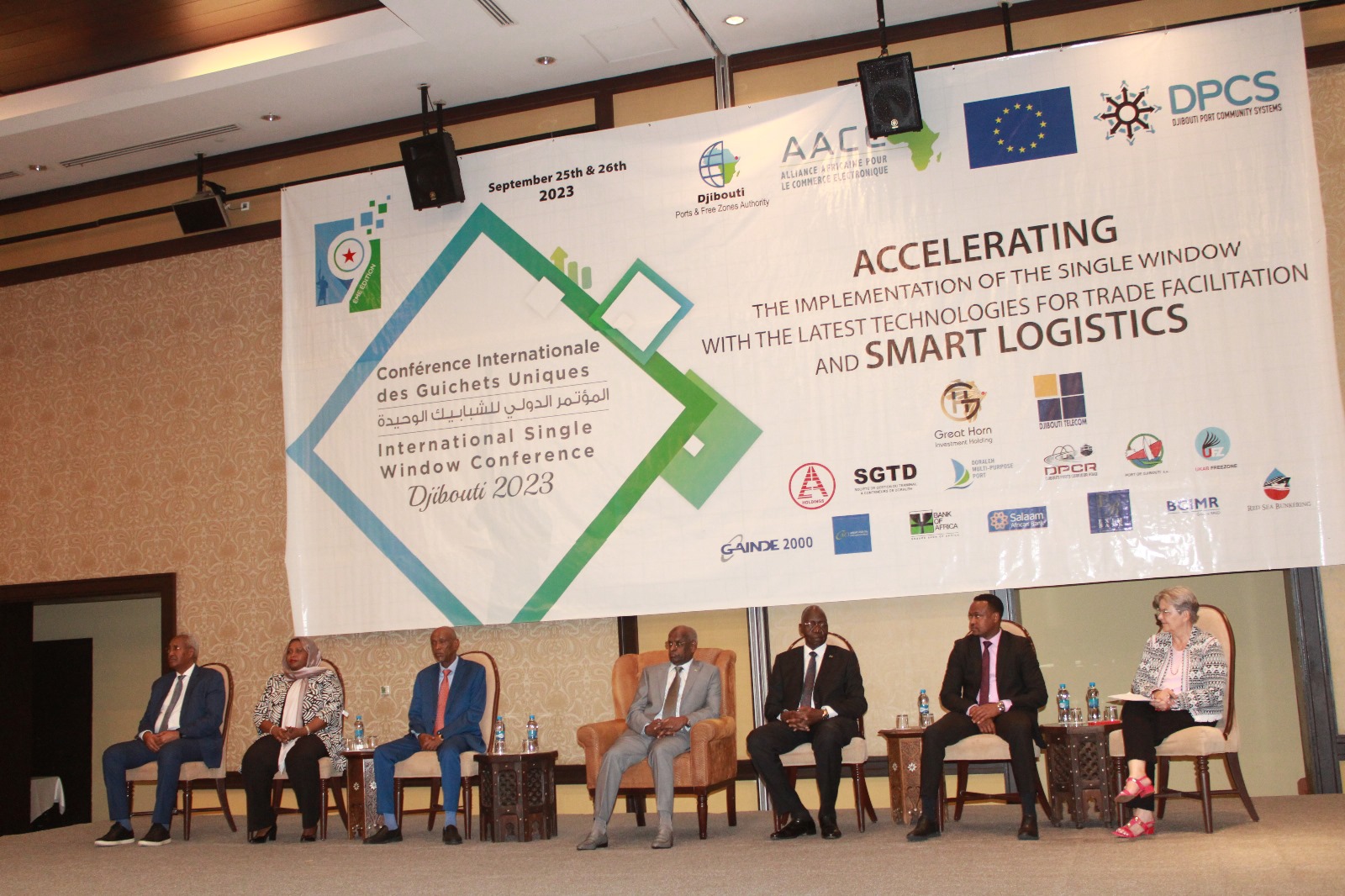
Our Projects are
Transforming African Trade
Quick Contacts
2nd Floor, Fidelity Insurance Centre Waiyaki Way, Westlands

The Prime Minister of the Republic of Djibouti, Mr. Abdoulkader Kamil Mohamed, kicked off the 9th edition of the International Single Window Conference at the Kempinski Hotel on Monday, 25 September 2023.
Several members of the government, including the Minister of Infrastructure and Equipment, Mr. Hassan Houmed Ibrahim, the Minister Delegate in charge of the Digital Economy and Innovation, Ms. Mariam Hamadou Ali, as well as the President of the Authority Ports and Free Zones of Djibouti (APZFD), Mr. Aboubaker Omar Hadi, took part in this conference.
In addition to the Republic of Djibouti, the African Alliance for Electronic Commerce is a partner of this event organised with the support of the European Union (EU). The two-day international conference highlights investment opportunities and ongoing developments on the African continent that will improve trade efficiency globally. This involves putting in place mechanisms likely to stimulate regional economic integration and facilitate regional trade, in accordance with the objectives of the African Continental Free Trade Area (AfCFTA). This is one of the objectives underlying the economic and commercial strategy of the Horn of Africa Initiative to which Djibouti is part of and is a collaborative effort with the Federal Republic of Ethiopia.
The EU has committed 32 million euros as part of the program “Promoting regional economic integration in the Horn of Africa through the development of the Djibouti corridor”, implemented by the French Development Agency (AFD ) and trade-aid-organisation TradeMark Africa (TMA). The program aims to improve the efficiency of one of Africa’s most active economic corridors, the Djibouti Corridor, while encouraging inclusive trade.
This is made possible through the digitalisation of business processes in government agencies, to reduce the time required to obtain business documents and accelerate the transit of goods along the corridor – from the port of Djibouti to Addis Ababa, the capital of Ethiopia. Electronic single windows and goods tracking systems are examples of these digital developments.
In a speech delivered on this occasion, the Prime Minister, Mr. Abdoulkader Kamil Mohamed, indicated that Djibouti enjoys a global reputation as a leading logistics hub. He reiterated that Djibouti Port’s activities constitute the heart of the trade route, and over the years, the country has continued to strengthen, modernise and optimise its port and logistics services. This was possible thanks to the materialisation of the commitment of the Djibouti Port Community Service (DPCS).
The Prime Minister added that the integration not only represents the country’s capacity to adopt cutting-edge technologies but symbolises a vision for Djibouti at the heart of a global web of commerce and exchange. “Our ambition is not limited to our borders: it encompasses the entire world, because we understand the interdependence of global markets.”
“To establish successful strategic partnerships, TradeMark Africa (TMA), the implementation partner of this program, signed agreements with the Djibouti Ministry of Trade and Tourism to eliminate non-tariff barriers along the Djibouti corridor and to align Djibouti’s national trade policy with the World Trade Organization Trade Facilitation Agreement and the African Continental Free Trade Area (ZLECAF),” he added.
The President of the Ports and Free Zones Authority of Djibouti (APZFD), Mr. Aboubaker Omar Hadi, for his part stressed that the promotion of the integration of intercontinental economic exchanges is in line with advancing the ideals of the African Union as well as the European Union to deepen trade and investment on the continent.
The EU’s Global Gateway investments aim to strengthen quality connectivity infrastructure around the world, including along corridors in Africa. This will deepen trade integration with Ethiopia through the harmonization of trade regimes and the adoption of common trade and customs rules and regulations.
The objective is to contribute to a reduction of 10% in the cost of trade, 15% in the time required for trade and 30% in the time required for customs clearance of goods at certain border posts.
This will also pave the way for a 15% increase in the volume of exports in key targeted sub-sectors and enable a 15% growth in income of targeted vulnerable groups, particularly women in trade. The port of Djibouti, today manages around 90% of Ethiopia’s international trade.
Read original article
Disclaimer: The views and opinions expressed in this article are those of the authors and do not necessarily reflect the official policy or position of TradeMark Africa.